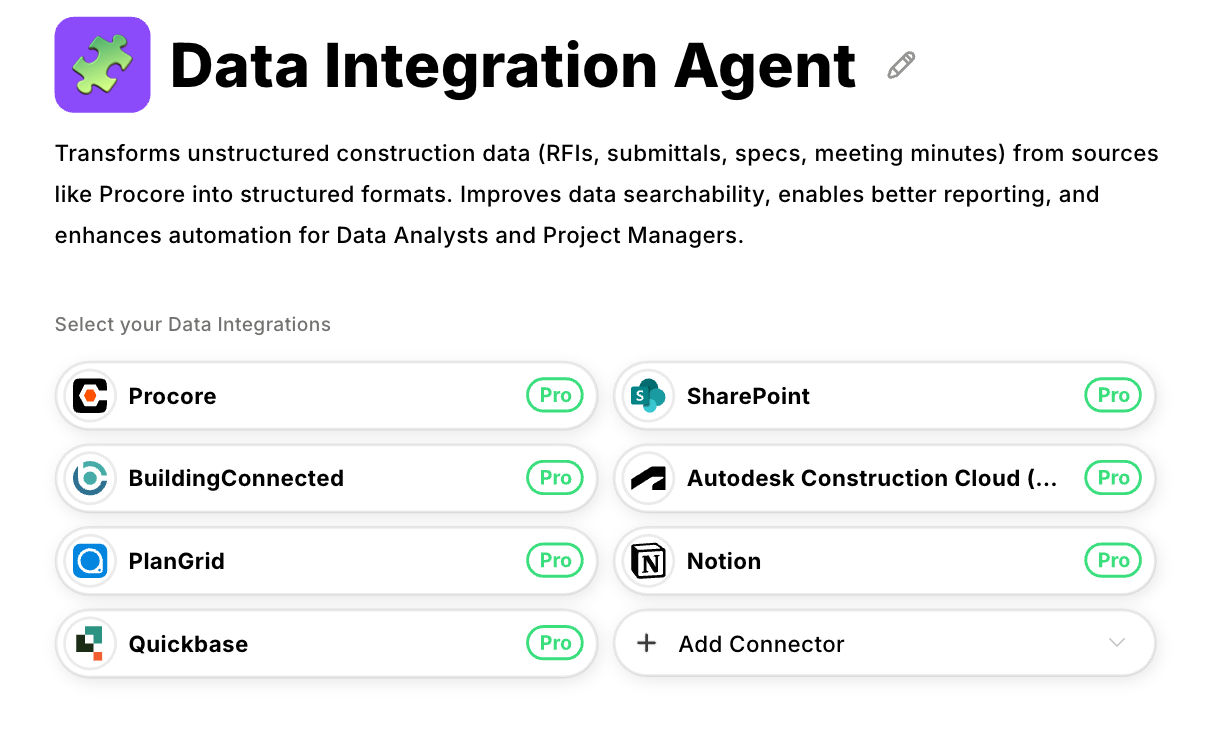All Posts
Construction - AI-Powered Project & Workflow Automation
How AI Agents Review, Analyze, and Create New RFIs

Stop missing RFI deadlines. AI agents route requests to appropriate team members, track critical windows, and assemble documentation automatically.
This article was last updated on November 8, 2025
Project timelines slip while your inbox fills with unanswered RFIs. Critical questions sit for days because nobody knows who should respond. When you finally track down the right person, they need hours to gather supporting documentation from five different systems. Meanwhile, your competitor submitted their bid package three days ago.
Construction projects generate hundreds of RFIs, each potentially impacting timelines and budgets when not handled efficiently. Project managers spend the majority of their time on document processing instead of actual project management. RFI analysis takes weeks when response deadlines are days.
AI agents eliminate this processing bottleneck by automatically routing RFIs to appropriate team members, tracking response deadlines, and compiling comprehensive response packages with supporting documentation. Teams shift from chasing down answers to managing successful projects.
Why RFI Processing Bottlenecks Kill Project Timelines
Every hour spent processing RFIs manually is an hour not spent managing the actual project. The administrative burden compounds as project complexity increases.
The Real Cost of Manual RFI Management
Manual RFI workflows create multiple failure points that directly impact your win rate and project delivery:
Response delays cost you contracts. When stakeholders can't get timely answers to their questions, decisions stall and work stops. Your team spends days figuring out who should answer which questions while competitors submit complete response packages.
Missed requirements destroy budgets. Critical specifications buried in lengthy documents get overlooked during manual review. Teams discover missing details during construction, not during bidding, turning profitable projects into money losers.
Documentation gaps create liability. When RFI responses live in email threads and phone call notes, proving what was communicated becomes impossible. Disputes arise because nobody can reconstruct the decision trail.
Team capacity doesn't scale. Your best technical people spend hours extracting requirements from PDFs instead of solving actual engineering problems. Adding more projects means adding more admin staff, not more project managers.
Common RFI Pain Points Construction Teams Face Daily
Project managers tell us they encounter the same problems repeatedly:
- RFI routing takes hours because nobody maintains an accurate expertise directory. Questions get forwarded multiple times before reaching someone who can actually answer them. Response times stretch from hours to days just finding the right person.
- Deadline tracking fails when reminders live in individual calendars instead of centralized systems. Critical RFIs slip through the cracks. Teams discover missed deadlines only when clients follow up asking where the response is.
- Document gathering consumes entire afternoons. A single RFI response might require specifications from BIM 360, cost data from the estimating system, and compliance documentation from the document management platform. Assembling this information manually means opening six different applications and copying data between them.
- Quality suffers under deadline pressure. Rushed responses miss supporting details. Teams submit incomplete packages because gathering all relevant documentation takes longer than the deadline allows.
Three Ways AI Transforms Your RFI Workflow
AI agents improve RFI handling through three core capabilities. These include intelligent review that catches what manual processes miss, analysis that identifies patterns across hundreds of documents, and generation that eliminates starting from blank templates.
Review: Automated Information Extraction and Validation
AI agents process incoming RFIs and extract structured data automatically. Optical character recognition converts scanned documents into machine-readable text. Natural language processing identifies key requirements, classifies content by type, and flags compliance-critical language.

Validation happens simultaneously with extraction. Agents check responses against project specifications, regulatory requirements, and company standards. Missing information gets flagged before responses go out, not after clients reject incomplete submissions.
Construction projects using automated review report fewer resubmissions. Teams catch incomplete responses during internal review instead of discovering gaps when clients push back.
Validation rules adapt to project requirements. For projects requiring specific certifications, agents verify that supporting documentation includes all required elements before marking responses complete.
Analysis: Pattern Recognition and Compliance Checking
Beyond processing individual RFIs, agents analyze patterns across your entire RFI history. Similar questions get grouped automatically. Recurring issues get identified for process improvement. Response quality metrics show which team members consistently provide complete answers.
Compliance checking happens automatically against frameworks like building codes, environmental regulations, and contract requirements. Agents flag responses that might create liability before they're submitted.
When RFI responses conflict with project specifications, agents identify the discrepancy and alert relevant team members. These conflicts often go unnoticed in manual reviews until they cause construction issues.
Pattern recognition also identifies predictable questions. If every project generates similar RFIs about specific materials or methods, agents suggest proactively including that information in future bid documents.
Creation: Smart RFI Generation with Pre-Populated Data
Creating new RFIs from scratch wastes time re-entering information that already exists in project systems. AI agents generate RFI templates based on project type and historical data, pre-populating fields with relevant information from existing documentation.
Project details, recipient lists, and reference documents get filled automatically. Your team adds the specific question and clarifying details instead of starting with blank forms.
The system recommends recipients based on RFI content. A question about electrical work suggests your electrical subcontractor and the electrical engineer. Custom routing rules ensure sensitive topics go to appropriate reviewers.
Duplicate prevention happens automatically. Before submitting a new RFI, agents check whether similar questions already exist. Teams avoid creating redundant requests that frustrate design teams and waste response capacity.
How AI Agents Handle RFI Processing From Start to Finish
AI agents transform RFI workflows by handling the administrative work that currently consumes your team's time. These agents don't just move documents around; they understand content, identify expertise requirements, and assemble complete response packages automatically.
Automatic RFI Routing Based on Team Expertise
When an RFI arrives, AI agents analyze the content and route it to the appropriate team member within minutes, not hours. The system maintains an expertise map based on past responses, project assignments, and documented specializations.
A structural question about foundation design goes directly to your structural engineer. Electrical specifications route to the electrical contractor. MEP coordination questions reach the right discipline lead without manual sorting.
The routing logic improves over time. When someone forwards an RFI to a different team member, the agent learns that expertise mapping and adjusts future routing. No manual directory updates required.
For complex RFIs requiring multiple specialists, agents identify all relevant team members and coordinate simultaneous review. Instead of serial handoffs that take days, parallel review happens in hours.
Deadline Tracking That Actually Works
AI agents monitor every RFI from submission through response, automatically escalating items that approach deadlines. You see dashboard alerts for RFIs entering critical windows, not panicked messages after deadlines pass.
The system tracks multiple deadline types, including internal review deadlines, client response requirements, and regulatory submission windows. Automated reminders reach responsible parties at configurable intervals (72 hours out, 24 hours out, and same-day for urgent items).
When responses arrive late, agents automatically notify stakeholders and update project documentation. No manual status updates required. The audit trail documents exactly when each action occurred for future reference.
Teams handling dozens of active RFIs simultaneously gain visibility impossible with manual tracking. Dashboard views show which responses are complete, which are in progress, and which require immediate attention.
Document Extraction and Response Package Assembly
AI agents extract critical information from incoming RFI documents automatically. Lengthy RFP documents get analyzed for requirements, specifications, and compliance elements in minutes instead of days.

The extraction process identifies:
- Technical specifications requiring response
- Compliance requirements needing documentation
- Related project documentation from past work
- Cost implications requiring estimator input
- Schedule impacts affecting project timeline
Once information is extracted, agents compile comprehensive response packages by pulling supporting documentation from connected systems. Relevant drawings come from BIM 360. Historical project data comes from Procore. Compliance certifications come from your document management system. Cost estimates come from estimating software.
Your team reviews assembled packages instead of gathering information from scratch. Response time drops dramatically because the research work happens automatically.
Meeting 48-Hour Response Windows Without Adding Staff
Response time expectations continue accelerating. Teams that previously managed comfortable week-long windows now face 48-hour requirements for urgent requests. Manual processing can't keep pace.
Automated extraction eliminates manual copy-and-paste work entirely. AI agents extract answers from vendor PDFs and populate comparison matrices in minutes instead of hours. Real-time dashboards rank urgent submissions automatically, so teams focus on critical deadlines instead of manually triaging incoming documents.
Organizations deploying automated processing report significant reductions in response time. Teams now meet accelerated demands without extra staff or sacrificed accuracy. Processing speed compounds across project lifecycles: faster RFI turnaround means faster design resolution, which means earlier construction starts.
Distributed teams gain centralized document control. Incoming files get parsed automatically, tagged with relevant metadata, and routed instantly. Communication platform integration delivers notifications with direct links to generated summaries. Teams get single source of truth without changing tools, and audit trails log every action for compliance documentation.
Connecting AI to Your Existing Stack
AI agents work with the construction software your team already uses. No rip-and-replace required. No forcing teams into new tools that slow them down during the learning curve.
Procore, PlanGrid, and BIM 360 Connectivity
Connect your core construction management platforms and watch information flow automatically. RFPs, submittals, change orders, and daily reports move between systems without manual data entry.
AI agents process incoming bid documents, cross-reference specifications against historical data, and flag potential issues for project manager review. Permit status updates and deadline requirements get tracked across multiple jurisdictions automatically.
Integration with scheduling tools like Microsoft Project and Primavera P6 provides real-time schedule updates without switching applications. Resource allocation data stays current as field conditions change.
Document Management System Compatibility
Whether you use SharePoint, Box, Google Drive, or industry-specific document management platforms, AI agents connect to extract and organize information. Documents get classified by type, tagged with metadata, and routed based on content.
Access controls remain intact. Agents respect existing permissions while automating document processing. Sensitive information stays restricted to authorized team members.
Version control happens automatically. When updated documents arrive, agents identify changes, notify affected team members, and maintain complete revision history for audit purposes.
Communication Platform Integration
While AI agents excel at importing and analyzing data from communication platforms, automated routing of specific updates like RFI responses directly through these channels requires additional configuration. Teams typically receive notifications with links to centralized dashboards rather than full response content pushed through chat channels.
The system maintains audit trails regardless of communication method. Every notification, response, and approval gets logged for compliance documentation.
Stop Drowning in RFIs With Datagrid's AI Agents
Manual RFI processing keeps your team buried in administrative work instead of managing actual projects. Datagrid connects your construction software ecosystem and deploys AI agents that handle the data work automatically:
- Intelligent RFI routing based on team expertise: AI agents analyze incoming RFI content and route requests to appropriate team members within minutes based on past responses, project assignments, and documented specializations. Structural questions reach structural engineers, electrical specifications reach electrical contractors, and complex items requiring multiple specialists get coordinated for parallel review.
- Automated deadline tracking and escalation: Agents monitor every RFI from submission through response, escalating items that approach critical windows with dashboard alerts and automated reminders at configurable intervals. No more missed deadlines discovered only when clients follow up asking where responses are.
- Comprehensive response package assembly: Agents extract requirements from incoming RFIs and automatically pull supporting documentation from connected systems like BIM 360, Procore, and your document management platform. Your team reviews assembled packages instead of spending hours gathering information from scattered systems.
- Integration with existing tools: The platform connects directly with construction management tools you already use (Procore, PlanGrid, Autodesk BIM 360, Microsoft Project, and Primavera P6) along with document systems like SharePoint, Box, and Google Drive. No forced software migrations or workflow disruption.
Start automating your RFI workflow with Datagrid and free your team from repetitive document processing.












